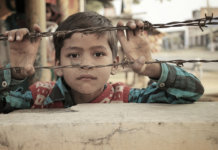On a global scale, it’s often considered that Germany (and the European Union) promote better and stricter animal welfare regulations and agricultural policies than other parts of the world—specifically the U.S., South America and China.
This is true in part, for example, Germany has prohibited the use of battery cage for raising chickens. In addition restriction are placed on gestation crates for sows. Both of these practices are still widely used in the U.S. However, Germany is not immune to the perils of industrialized farming.

The activist group Animal Rights Watch (ARIWA) has just released secret videos from 2015 illustrating flagrant violations of animal welfare and farming practices.
Throughout 2015 activists from the ARIWA secretly filmed animals being kept and slaughtered in inhumane conditions on industry leading farms. The images were then first released to the regional public broadcaster NDR and the Süddeutsche Zeitung newspaper, inviting independent analysts to comment of the photos before they were released to the public.
According to several animal rights activists, opposition politicians and veterinarians the images illustrate “clear violations of the law”. These include livestock such as pigs and turkeys held in overcrowded conditions with open wounds, cattle and pigs were being slaughtered under conditions not conducive to Germany’s animal welfare laws and newborn piglets being brutally killed.
So who are the prominent figures?
The farm owners are some of the industry’s most prominent figures, including:
- Paul Hegemann, the chairman of the Association of German Pig Production (ZDS);
- John Röring, president of the Westphalia-Lippe Agricultural association and an elected CDU lawmaker in the Bundestag;
- Helmut Gumpert, president of the Thuringian Farmers’ Asssociation;
- Thomas Storck, chairman of the Turkey Association
According to DW, a spokeswoman for Hegemann admitted to the issues and expressed “regret” over the images. The others issued statements through attorneys declining comment or did not respond.
What can come from this?
Footage of livestock being treated in an inhuman manner is not new, innovative, or at this point, shocking. What is shocking, however, is the fact that progress so slow—or even nonexistent—and factory farming continues to be the status quo all over the world and in Germany, too.
The German Farmers’ Association (DBV) criticized the use of the video material as “unauthorized entry onto private property” and that the “older imagery” had “come under dubious circumstances” by the ARIWA.
However, Erasmus Müller, a member of the ARIWA said that it was vital to release footage from farms owner by prominent figures. These organizations (like the DBV) continue to accuse activists of exaggerating individual cases, but rather, Müller says that these videos suggest that the cruelty is more frequent and widespread.
Where to go from here?
The only answer that is conducive to animal welfare concerns is to buy meat that is certified by certain protection standards. In addition, there has to be regular checks on industrial farms. Letting the agriculture industry continue to have free reign is harmful not only to the animals themselves, but to our human health and the environment.









